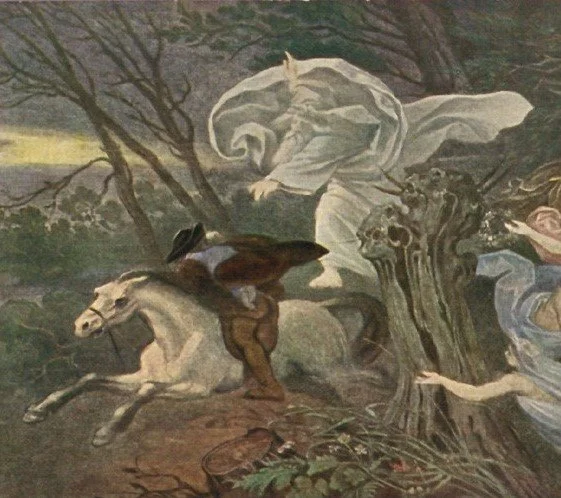The Erlking
The Erlking is an entity from European folklore, the word ‘Erlking’ comes from the German: Erlkönig literaly meaning alder-king. He is/was/maybe a lord of the forest and King of the Faeries. He was believed to lurk in ancient woodland, there he would stalk any unfortunate children who linger too long beneath the boughs of his realm, it was said he could kill mortals with a single touch.
The Name was first used in the poem ‘Erlkönigs Tochter’ (1778) by German romanticist Johann Gottfried Herder. The poem tells the tale of a boy being carried on horseback by his father through the night, the purpose of their journey isn’t explained, I can only imagine that it was an urgent one. As they travel the boy becomes fearful, complaining that they are being followed by an unnatural being. The father, clearly a sympathetic man, totally dismisses his sons complaints, putting down the odd sights and sounds to nocturnal shadows, and the wind in the trees. I don’t know about you but I have a feeling this ‘father of the year’ will come to regret this!
As they continue their journey, The Erlking tries to lure the boy using riches, clothes and his daughters, I have no idea whether the poor daughters agreed to be bait, and if they didn’t I can only hope they fully expressed their disproval when they next get together for a family dinner. Finally a little bit annoyed, the Erl-King declares his intention to take the boy by force (I suppose at this stage his thinking ran something like this; If I’m going to have an ear-bending at the hands of my irate daughters, I might as well have something to show for it.)
When the father finally arrives at his destination he finds that his beloved son is dead!
So a bit of a grim poem really, but an entertaining one never-the-less, The ‘new Oxford American Dictionary describes the Erl-king in the following way: a bearded giant or goblin who lures little children to the land of death.
Anyway here is a translation of the poem from German, by Edgar Alfred Bowering. Hope you enjoy it, stay spooky.
Who rides there so late through the night dark and drear?
The father it is, with his infant so dear;
He holdeth the boy tightly clasp'd in his arm,
He holdeth him safely, he keepeth him warm.
My son, wherefore seek'st thou thy face thus to hide?
Look, father, the Erl-King is close by our side!
Dost see not the Erl-King, with crown and with train?
My son, 'tis the mist rising over the plain.
"Oh, come, thou dear infant! oh come thou with me!
For many a game, I will play there with thee;
On my strand, lovely flowers their blossoms unfold,
My mother shall grace thee with garments of gold."
My father, my father, and dost thou not hear
The words that the Erl-King now breathes in mine ear?
Be calm, dearest child, 'tis thy fancy deceives;
'Tis the sad wind that sighs through the withering leaves.
"Wilt go, then, dear infant, wilt go with me there?
My daughters shall tend thee with sisterly care;
My daughters by night their glad festival keep,
They'll dance thee, and rock thee, and sing thee to sleep."
My father, my father, and dost thou not see,
How the Erl-King his daughters has brought here for me?
My darling, my darling, I see it aright,
'Tis the aged grey willows deceiving thy sight.
"I love thee, I'm charm'd by thy beauty, dear boy!
And if thou'rt unwilling, then force I'll employ."
My father, my father, he seizes me fast,
For sorely, the Erl-King has hurt me at last.
The father now gallops, with terror half wild,
He grasps in his arms the poor shuddering child;
He reaches his courtyard with toil and with dread,
The child in his arms finds he motionless, dead.
